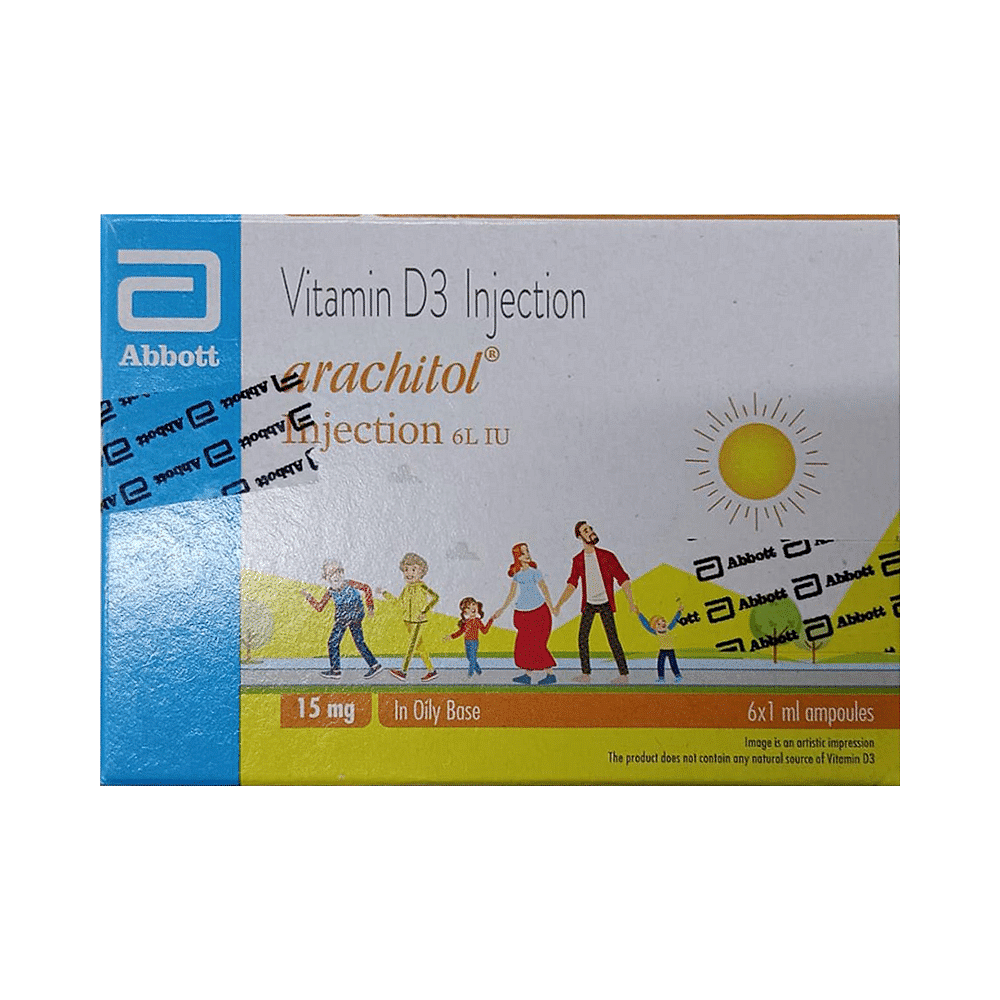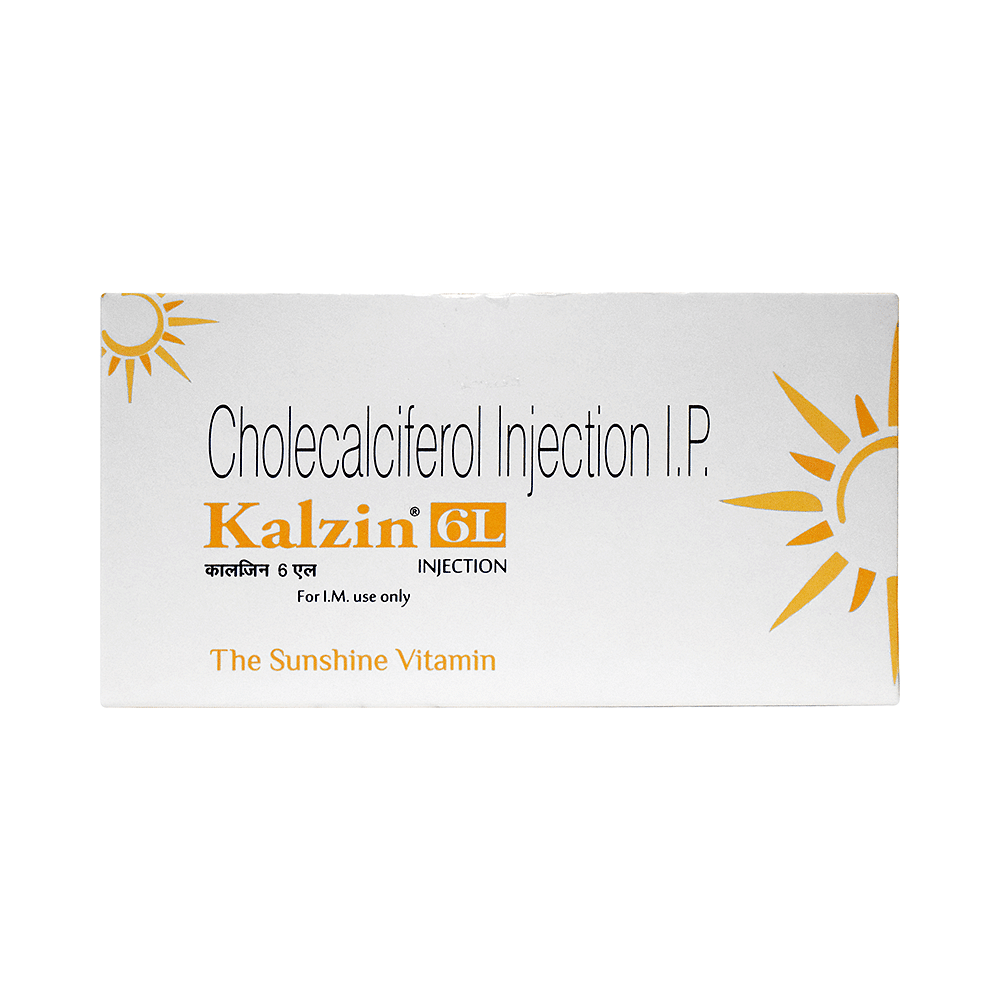
Diafast 6 Injection
Manufacturer
Bonsai Pharma
Salt Composition
Vitamin D3 (600000IU)
Key Information
Short Description
Diafast 6 Injection helps your body to absorb a mineral called calcium, which is important for maintaining strong bones.
Dosage Form
Injection
Introduction
Diafast 6 Injection is given under the supervision of a healthcare professional and should not be self-administered. You should take it regularly to get the most benefit from it. If you are using it to treat osteoporosis you will be prescribed other medicines as well. This medicine may be only part of a complete program of treatment that also includes making changes to your diet and taking calcium and vitamin supplements. Learn about the foods you should eat to make sure you get enough calcium and vitamin D in your diet.
Directions for Use
Your doctor or nurse will give you this medicine. Kindly do not self administer.
Safety Information
Side Effects
No common side effects listed.
Alcohol Warning
Caution is advised when consuming alcohol with Diafast 6 Injection. Please consult your doctor.
Breastfeeding Warning
Diafast 6 Injection is safe to use during breastfeeding. Human studies suggest that the drug does not pass into the breastmilk in a significant amount and is not harmful to the baby.
Pregnancy Warning
Diafast 6 Injection is safe to use during pregnancy. Most studies have shown low or no risk to the developing baby.
Interacting Medicines
Orlistat
How it works
Diafast 6 Injection is a form of vitamin D. It raises vitamin D levels in your blood. This in turn raises calcium levels in your blood by helping you absorb more calcium from food.
Quick Tips
Get enough sun exposure 10-30 minutes thrice a week. Eat vitamin D rich diet like egg yolk, mushrooms, cheese, milk, butter, fortified food and oily fish.
Related Medicines

Devita 600000IU Injection

Nova D3 Injection

Arachitol 6L Injection

Kalzin 6L Injection

Ecodol 6 Injection

Cliff D3 600000IU Injection
Frequently asked questions
What are the benefits of taking Diafast 6 Injection?
Diafast 6 Injection is important for maintaining bone health, supporting the immune system, brain, and nervous system. It also regulates insulin levels and is important for a healthy heart and blood vessels.
What is the best time to take Diafast 6 Injection?
Diafast 6 Injection can be taken at any time of day, morning or night. However, there is limited information available about the ideal time to take it. It's essential to follow your doctor's instructions and consult them if you have questions regarding the timing of administration. Do not self-administer.
How is Diafast 6 Injection administered?
Diafast 6 Injection should be administered under the supervision of a trained healthcare professional or doctor only, and should not be self-administered. The dose will depend on the condition being treated and determined by your doctor. It's important to follow your doctor’s instructions carefully for optimal results.
Who should avoid taking Diafast 6 Injection?
Diafast 6 Injection should not be taken by individuals who are allergic to cholecalciferol, those with high blood calcium levels, or if there is evidence of calcium in their urine. The use of this medication should be avoided for patients with kidney stones or severe kidney problems. Consult your doctor before taking Diafast 6 Injection.
What are the potential risks of exceeding the recommended dosage of Diafast 6 Injection?
Taking too much Diafast 6 Injection over an extended period may increase blood calcium levels (hypercalcemia). This could lead to symptoms such as weakness, fatigue, vomiting, diarrhea, sluggishness, kidney stones, increased blood pressure, and growth retardation in children. If you experience any of these symptoms, consult your doctor immediately.
How much Vitamin D3 should I take daily?
Diafast 6 Injection provides a form of vitamin D used as a supplement for patients with vitamin D deficiency. The recommended daily intake of vitamin D3 is 4,000 IU/day. However, your diet might not always meet the required amount, and you may need to take 1,000-3,000 IU/day of Vitamin D3 supplements.
What happens if my Vitamin D3 levels are low?
Low vitamin D3 levels can result in rickets in children and osteomalacia in adults. Additionally, a lack of vitamin D may also increase the risk of type 1 diabetes, high blood pressure, depression, certain types of cancer, and osteoporosis.


